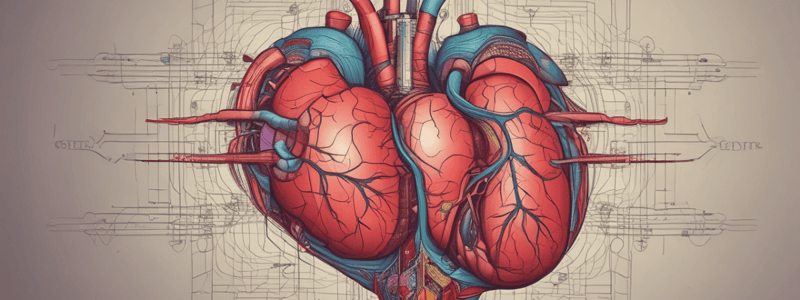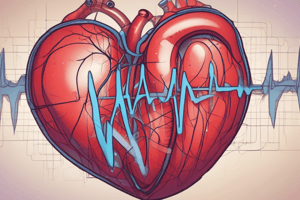Podcast
Questions and Answers
What is the purpose of the refractory period in neurons?
What is the purpose of the refractory period in neurons?
To prevent overlap or disruption of action potentials
What are some risk factors that can increase the likelihood of dysrhythmias?
What are some risk factors that can increase the likelihood of dysrhythmias?
Heart problems, high blood pressure, electrolyte imbalance, certain medications, heavy drinking, thyroid disease, obstructive sleep apnea, and strong emotional stress.
What is the primary mechanism of action of calcium channel blockers in supraventricular tachycardia?
What is the primary mechanism of action of calcium channel blockers in supraventricular tachycardia?
Slowing the heart rate and reducing the frequency of abnormal beats.
What is a common adverse effect of amiodarone therapy?
What is a common adverse effect of amiodarone therapy?
What is the primary goal of pharmacologic management of ventricular tachycardia?
What is the primary goal of pharmacologic management of ventricular tachycardia?
What is an important nursing assessment for antidysrhythmic toxicity?
What is an important nursing assessment for antidysrhythmic toxicity?
What is the classification of antidysrhythmic drugs that slows the heart rate and reduces the frequency of abnormal beats?
What is the classification of antidysrhythmic drugs that slows the heart rate and reduces the frequency of abnormal beats?
What is the primary mechanism of action of amiodarone?
What is the primary mechanism of action of amiodarone?
What is the primary concern when diltiazem (Cardizem) is prescribed for atrial fibrillation?
What is the primary concern when diltiazem (Cardizem) is prescribed for atrial fibrillation?
What is the priority action when a patient develops asystole after receiving adenosine (Adenocard) for PSVT?
What is the priority action when a patient develops asystole after receiving adenosine (Adenocard) for PSVT?
What is the classification of diltiazem (Cardizem) in terms of its anti-dysrhythmic properties?
What is the classification of diltiazem (Cardizem) in terms of its anti-dysrhythmic properties?
What is a potential adverse effect of amiodarone therapy?
What is a potential adverse effect of amiodarone therapy?
What is the pharmacologic management of ventricular tachycardia?
What is the pharmacologic management of ventricular tachycardia?
What should the nurse assess for when monitoring a patient for antidysrhythmic toxicity?
What should the nurse assess for when monitoring a patient for antidysrhythmic toxicity?
Why are calcium channel blockers like diltiazem (Cardizem) effective in supraventricular tachycardia?
Why are calcium channel blockers like diltiazem (Cardizem) effective in supraventricular tachycardia?
What is the priority nursing assessment when a patient is experiencing antidysrhythmic toxicity?
What is the priority nursing assessment when a patient is experiencing antidysrhythmic toxicity?
What is the primary antidysrhythmic medication used to treat Ventricular Fibrillation (VF)?
What is the primary antidysrhythmic medication used to treat Ventricular Fibrillation (VF)?
What are some common adverse effects of amiodarone therapy?
What are some common adverse effects of amiodarone therapy?
Why is the half-life of amiodarone significant in terms of managing adverse effects?
Why is the half-life of amiodarone significant in terms of managing adverse effects?
What is the primary indication for adenosine therapy?
What is the primary indication for adenosine therapy?
What is unique about the administration of adenosine?
What is unique about the administration of adenosine?
What nursing assessment parameters are critical for monitoring antidysrhythmic toxicity?
What nursing assessment parameters are critical for monitoring antidysrhythmic toxicity?
Why is rapid administration of adenosine crucial in the treatment of Supreventricular Tachycardia?
Why is rapid administration of adenosine crucial in the treatment of Supreventricular Tachycardia?
What is the significance of amiodarone's half-life in terms of toxicity management?
What is the significance of amiodarone's half-life in terms of toxicity management?
What is the primary mechanism of action of antianginals and how does it benefit patients with angina?
What is the primary mechanism of action of antianginals and how does it benefit patients with angina?
What is the priority action when a patient is experiencing an angina episode and has forgotten how to take their nitroglycerin tablets?
What is the priority action when a patient is experiencing an angina episode and has forgotten how to take their nitroglycerin tablets?
What is the importance of medication adherence and lifestyle management in patients with angina?
What is the importance of medication adherence and lifestyle management in patients with angina?
What is the priority nursing implication resulting from the effect of antianginals on blood vessel diameter?
What is the priority nursing implication resulting from the effect of antianginals on blood vessel diameter?
What is the primary goal of pharmacologic management of ventricular tachycardia?
What is the primary goal of pharmacologic management of ventricular tachycardia?
What is the classification of antidysrhythmic drugs that slow the heart rate and reduce the frequency of abnormal beats?
What is the classification of antidysrhythmic drugs that slow the heart rate and reduce the frequency of abnormal beats?
What is a potential adverse effect of amiodarone therapy?
What is a potential adverse effect of amiodarone therapy?
What should the nurse assess for when monitoring a patient for antidysrhythmic toxicity?
What should the nurse assess for when monitoring a patient for antidysrhythmic toxicity?
What are some subtle signs of adverse events that a patient may experience when taking anticoagulant therapy?
What are some subtle signs of adverse events that a patient may experience when taking anticoagulant therapy?
Why might a patient prefer to take rivaroxaban over warfarin or enoxaparin?
Why might a patient prefer to take rivaroxaban over warfarin or enoxaparin?
What nursing actions must be implemented to ensure the accuracy and safety of continuous heparin infusion?
What nursing actions must be implemented to ensure the accuracy and safety of continuous heparin infusion?
What patient findings would indicate a therapeutic response to heparin therapy?
What patient findings would indicate a therapeutic response to heparin therapy?
What is the primary goal of pharmacologic management of ventricular tachycardia?
What is the primary goal of pharmacologic management of ventricular tachycardia?
What is an important nursing assessment for antidysrhythmic toxicity?
What is an important nursing assessment for antidysrhythmic toxicity?
What is the classification of antidysrhythmic drugs that slows the heart rate and reduces the frequency of abnormal beats?
What is the classification of antidysrhythmic drugs that slows the heart rate and reduces the frequency of abnormal beats?
What is the primary mechanism of action of calcium channel blockers in supraventricular tachycardia?
What is the primary mechanism of action of calcium channel blockers in supraventricular tachycardia?
Flashcards are hidden until you start studying
Study Notes
Antidysrhythmic Medications
- Ventricular Fibrillation (VF) is treated with lidocaine and phenytoin.
- Amiodarone has an extremely long half-life, which can lead to prolonged therapeutic and adverse effects even after the drug has been discontinued.
- Common adverse effects of amiodarone include:
- Pulmonary toxicity
- Thyroid disorders
- Bradycardia
- Hypotension
- SA node dysfunction
- AV block
- Ataxia
- QT prolongation
- Torsades de pointes
- Vomiting
- Constipation
- Photosensitivity
- Abnormal liver function test results
- Jaundice
- Visual disturbances
- Hyperglycemia or hypoglycemia
- Dermatologic reactions
- Vasculitis
- Blue-gray coloring of the skin (face, arms, neck)
Adenosine
- Adenosine is used to treat Supreventricular Tachycardia.
- It has an extremely short half-life.
- Adenosine is administered rapidly to allow for fast circulation to the cardiac tissue.
Dysrhythmias Risk Factors
- Risk factors that make dysrhythmias more likely to occur include:
- Heart problems (e.g., coronary artery disease, abnormal heart valves, cardiomyopathy, heart problems present at birth, previous heart surgery)
- High blood pressure
- Electrolyte imbalance (e.g., low levels of potassium, magnesium, or calcium)
- Medications (e.g., those that increase alertness or energy, cold medicines, or herbal supplements)
- Heavy drinking (35 drinks in a week) or binge drinking (5 or more drinks in a row)
- Other factors (e.g., thyroid disease, obstructive sleep apnea, viral illnesses, tobacco, changes in posture, exercise, and strong emotional stress)
Antidysrhythmic Medications Classifications
- Complete the table comparing the different classifications of antidysrhythmic drugs.
Nursing Actions and Patient Assessment
- Nursing actions for antidysrhythmics include:
- Skillful nursing assessment
- Close monitoring of heart rate, blood pressure, heart rhythms, general well-being, skin color, temperature, and heart and breath sounds
- Priority actions for patients taking antidysrhythmics include:
- Assessing vital signs (e.g., blood pressure, heart rate)
- Monitoring for signs of bleeding (e.g., blood in urine/stool, petechiae, nosebleeds)
- Educating patients on medication adherence and lifestyle management
Anticoagulant Medications
- Rivaroxaban is a direct oral anticoagulant that does not require frequent monitoring of blood and dosage adjustment.
- Patients may prefer rivaroxaban over warfarin or enoxaparin due to its route of administration and reduced monitoring needs.
Heparin Infusion
- Nursing actions to ensure the accuracy and safety of continuous heparin infusion include:
- Double-checking physician's order, dosage, rate of infusion, bolus dosage, and bolus concentration
- Properly configuring and programming the infusion smart pump
- Monitoring aPTT levels to ensure therapeutic range (1.5 to 2.5 times the normal control value)
- Frequently assessing patients for bleeding, blood in urine/stool, petechiae, nosebleeds, and increased bleeding from menstrual cycle
- Educating patients on the reason for heparin therapy, side effects, and the need to report any signs of bleeding immediately
Antianginal Medications
- Antianginal medications dilate blood vessels, particularly the coronary arteries, to increase blood flow to the heart muscle and reduce chest pain.
- Nursing implications of antianginal medications include:
- Assessing vital signs (e.g., blood pressure, heart rate)
- Educating patients on medication adherence and lifestyle management to manage angina
Studying That Suits You
Use AI to generate personalized quizzes and flashcards to suit your learning preferences.




